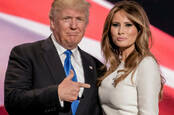The United States Department of Homeland Security's Citizenship and Immigration Services has released new and strict rules for H-1B visas, the permit used by many-a-tech-company to bring skilled workers to the USA from abroad.
President Donald Trump campaigned on a promise to restrict use of the visas, which he claimed are used to import workers who are paid less than locals and therefore make it harder for US citizens to get a job. Trump was also uncomfortable with outsourcers' use of the visa, saying they displaced American workers. Labour hire agencies also sought the visa, bringing in people and then finding them jobs after they arrived.
The USA's recently cracked down on employers who use the visa, with more inspections to make sure they're not being abused.
Now a new Policy Memorandum (PDF), released late last week, revealed the Trump Administration's plans to make H-1B visas harder to obtain by requiring extensive documentation about exactly what workers will do, why they're needed and where they will work.
Applicants will now need to demonstrate they are already an employee of a stateside organisation, while businesses who hire H-1B holders must provide signed "detailed statements of work or work orders" and a letter detailing "… the specialized duties the beneficiary will perform, the qualifications required to perform those duties, the duration of the job, salary or wages paid, hours worked, benefits, a detailed description of who will supervise the beneficiary and the beneficiary's duties, and any other related evidence."
There's lots more language in the memo about making sure that "intermediary contractors, vendors, or brokers" aren't really the entities employing a visa applicant. Applicants who envisage they'll work on multiple sites are required to "file an itinerary with a petition that requires services to be performed in more than one location. The itinerary must include the dates and locations of the services to be provided."
Details sought include "The names, addresses (including floor, suite, and office) and telephone numbers of the locations" of the places they'll work, all with corroborating evidence.
The level of documentation required will make it rather hard to have an H-1B visa holder farmed out to different employers, making it more likely the permit is used by employers to fill a specific vacancy rather than by outsourcers or agencies.
Tech industry lobbyists have long argued that H-1Bs help the American economy by bringing in eager talent to an industry that's nearly always short of skilled people. That argument's about to get its test, as the annual H-1B visa application lottery closes in April. ®
Sponsored: Minds Mastering Machines - Call for papers now open


No comments:
Post a Comment